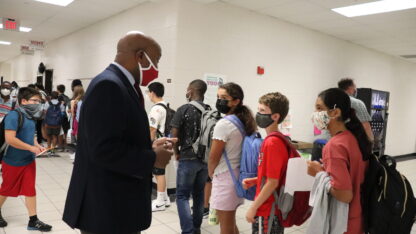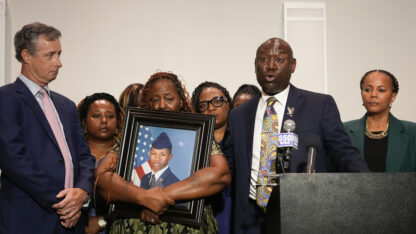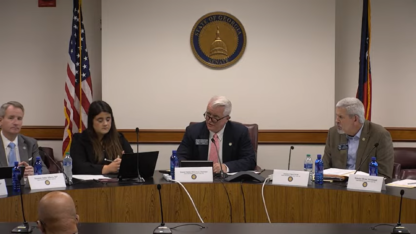5 Georgia education storylines to watch in 2023

A Cobb County School bus moves on the street Friday, March 13, 2020, in Kennesaw, Ga. (AP Photo/Mike Stewart, File)
1. “The pandemic slide”
This is what some are calling the months of learning students lost during the pandemic. Georgia school districts received unprecedented amounts of money through federal relief programs, at least 20% of which is supposed to directly address learning loss. School districts have invested in extra tutoring and summer programs to help close the gap. Atlanta Public Schools has extended the school day by 30 minutes to provide additional instruction. Dr. Tim Sass, the director of Georgia State University’s Metro Atlanta Policy Lab for Education, says schools should focus on high-dosage tutoring while students are in school, since fewer students participate in summer programs.
“We have a report looking at a summer school from one of the metro districts and the big problem was that students just didn’t show up,” he says. “Less than 20% of students invited to summer school, where those invitations were based on the fact that their achievement levels were at least a grade level behind, didn’t go.”
Several metro Atlanta districts have invested in high-dosage tutoring during the school day. Some have also built in intervention periods to help kids catch up. Federal aid runs out after the 2023-24 school year, so districts don’t have a lot of time left to make use of the money.
2. The renewed reading wars
This debate has roots in the early 1990s, when some educators fought over the benefits of phonics instruction vs. whole language. Phonics focused on teaching students to sound out words, while whole language focuses on identifying words by sight. Many school districts ended up adopting an approach called ‘balanced literacy,’ which in theory combined the two. Now, the issue has been reborn as dyslexia advocates push schools to invest in a program called, “The Science of Reading.” The program incorporates structured literacy programs that focus on phonics instruction (sound/symbol relationships), spelling, fluency and comprehension. Some districts, like Fulton County schools, have invested in SOR training for teachers. But some experts say SOR isn’t as scientific as its proponents would like to believe. The Georgia House of Representatives has developed a study committee on literacy instruction and could introduce legislation on the issue this session.
3. An updated funding formula?
Georgia’s public school funding formula is called Quality Basic Education (QBE). It’s a student-based formula, meaning it estimates the cost of providing a quality, basic education for each student in Georgia’s schools and provides money to districts based on those costs. The problem, some say, is the formula was developed in 1985 and has only been slightly amended since then. Educators point out that in 1985, technology funding wasn’t included in the formula, for example. In 2016, then-Gov. Nathan Deal put together a commission tasked with making recommendations about updating QBE. The commission did so, yet no changes were ultimately made to the formula. Many advocates are also pushing lawmakers to allocate more funding for students in poverty. Could 2023 be the year lawmakers take this on?
4. A mental health crisis?
The Atlanta-based Centers for Disease Control and Prevention says 37% of K-12 students struggle with mental health issues. The American Psychological Association says 60% of college students are living with at least one mental health challenge.
Georgia’s K-12 public schools and university system have acknowledged the need for expanded mental health and counseling services for students, especially since the pandemic started. Atlanta Public Schools, for example, has made telehealth available to all students free of charge. That includes mental health services. Dr. Nick Ladany is the president of Oglethorpe University and also a counseling psychologist. The university has redesigned mental health services to offer unlimited counseling sessions for students. Ladany says Covid shone a light on the state of students’ mental health.
“It was headed in this direction, anyway, because we’ve seen an increase in mental health challenges over the last two decades,” Ladany says. “The pandemic just accelerated what was already there.”
5. The expansion of (and investment in) early education
Early education advocates have long touted research showing the benefits of early education. The sooner children start learning, the better their overall academic outcomes are. The Metro Atlanta Chamber and the Georgia Early Education Alliance for Ready Students (GEEARS) issued a report in 2019 that shows childcare access pays off for adults too. Employers who offer childcare or subsidies for their employees benefit from reduced employee absences. The report estimated childcare challenges cost Georgia businesses $1.75 billion in losses in one year. While Georgia has had public Pre-Kindergarten available for decades now, districts are now focused on expanding access to that program and in the case of the DeKalb County School District, expanding public early education to include three year olds. Clayton County Public Schools has added a Pre-K expansion to its next round of E-SPLOST funding with the goal of offering public Pre-K to every four-year-old in the school district. Atlanta Mayor Andre Dickens has also pledged to invest in early education, allocating $5 million of city funding toward refurbishing centers, improving teacher pay and curbing costs for families.
This is part of WABE’s Storylines To Watch In 2023 series. Click here to see which storylines WABE reporters are watching on their beats — including arts and culture, criminal justice, the environment, health, housing, immigration and politics — so you’re in-the-know on what the year may bring.








